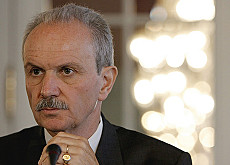Economy expected to weather financial storm

Swiss National Bank (SNB) president Jean-Pierre Roth says the Swiss economy is robust enough to withstand the current financial market crisis in the United States.
Roth told the NZZ am Sonntag newspaper that domestic demand was strong as were consumer figures.
Roth’s remarks follow an earlier warning by SNB board member Philipp Hildebrand, who said that turmoil in credit markets could affect economic growth even though it was premature to give a detailed appraisal.
High default rates for US sub-prime mortgages triggered a widening crisis in financial markets that spread to other asset classes.
“We have not got to the end of the story regarding the development of mortgage markets in the United States,” said Roth. “The origins are in cheap credit [for people with no income and no assets.] What happened is unbelievable.”
But he added that he expected the Swiss financial system to withstand the current situation. “The commitments of the large [Swiss] banks […] are in proportion to their own capital,” he said.
Roth warned though that it was still unclear where all the risks lie at this moment. “But I have great trust that the finance institutions have a grip on the risks.”
His remarks appeared after the US Federal Reserve on Friday cut the discount rate it charges banks in an effort to stabilise credit markets, prompting a rally in stock prices on Wall Street.
Following this move economists are starting to question whether the world’s main central banks would push ahead with interest rate rises as doubts grow about economic growth.
Interest rate unchanged
Asked if higher Swiss interest rates were on the cards, Roth said that the SNB would “as usual consider all the existing elements” at its next interest-setting meeting in September.
He said the state of the Swiss economy was sound. “The information that we have at the moment paints a very positive picture.”
The national bank had been expected to make further small rate increases to cool a buoyant economy before the crisis in credit markets erupted.
Europe’s central banks intervened massively last week to help financial markets find some stability, injecting huge sums of money. The SNB took part in the operation, ensuring the stability of the local monetary market.
Roth said though that the central banks should not seek to eliminate market volatility, and aim only to restore liquidity and to assure markets.
“These short central bank interventions serve only to assure that in a crisis situation the system of liquidity provision functions in an orderly manner,” he added.
swissinfo with agencies
Switzerland’s central bank opened for business on June 20, 1907.
It conducts the country’s monetary policy as an independent central bank. Its primary goal is to ensure price stability, which it considers an important condition for growth and prosperity.
The SNB is responsible for the issuing of banknotes and the distribution of coins.
Sub-prime lending generally refers to the practice of making loans to borrowers who do not qualify for market interest rates because of problems with their credit history.
Sub-prime mortgages are risky for both creditors and debtors because of the combination of high interest rates, bad credit history and the financial situations often associated with sub-prime applicants.
The sub-prime mortgage crisis refers to the rash of sub-prime mortgage foreclosures that began in the US at the end of 2006 and has continued this year.
It has caused several major lenders, including New Century Financial Corporation, to shut down or file for bankruptcy, leading to the collapse of stock prices for many in the sub-prime mortgage industry.

In compliance with the JTI standards
More: SWI swissinfo.ch certified by the Journalism Trust Initiative











You can find an overview of ongoing debates with our journalists here . Please join us!
If you want to start a conversation about a topic raised in this article or want to report factual errors, email us at english@swissinfo.ch.